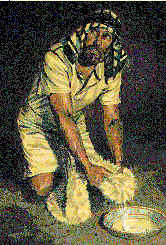
We don’t just have upon us a crisis of faith, but also a crisis of faithfulness.
We’ve been reviewing Francis Chan’s book Crazy Love. I encourage everyone to read it. It’ll do you good. Also, it makes an interesting and thought-provoking small group study, or Sunday School class.

This last lesson was on Risk and Faith. Chan asked everyone to do something in their regular life that requires faith. He asked that we abandon the typical planning we do to minimize our risk. We should do something others could think of as silly, and allow ourselves to live and act in a more vulnerable way. We shouldn’t rely in our stuff to satisfy us. We should live bigger lives.
Along the same lines, Rolf Potts leads this sort of recommended simpler type of lifestyle. He calls it vagabonding. (I found out about Rolf through the Tim Ferriss site. Thank you, Tim.)For Potts, a travel writer, his style is not just a method of travel, but a way of life. It’s unlike the American way of life, because it does not trust in stuff.
I’ve wondered if it’s the case that in America we seem to act like “in god we trust” refers to the money itself, or the things we can buy with it.
We do a lot to feel safe. We buy insurance to minimize various kind of threats. We buy things we feel sure will help us, or at least soothe us. What is the lasting consequence of this approach? A false sense of control? Feathering our pillow of self-sufficiency? Other things…
 Rolf Potts takes the theme of traveling light to a whole new level, as he now begins his No Baggage Challenge: Traveling to 12 countries in 6 weeks—With NO baggage (not even a man purse/satchel). [His blog details his travels, and his packing techniques are also quite useful.]
Rolf Potts takes the theme of traveling light to a whole new level, as he now begins his No Baggage Challenge: Traveling to 12 countries in 6 weeks—With NO baggage (not even a man purse/satchel). [His blog details his travels, and his packing techniques are also quite useful.]
The journey of faith is the same way. When we seek out the comfortable, and we travel heavy, by preparing (mentally or physically) for every potential event, challenge, or threat–something important gets left behind. Perspective for one thing. But what else?
In the life of faith, “taking nothing for the journey” means that one must trust in God’s provision (and his way of providing), trust others, and build relationships. It’s not about what we’ve packed (prepared) for, it’s about the trip itself. It’s about being brave, and opening up to others, and the experience of not being weighted down (both literally and figuratively) by our presuppositions: What we think the trip should look like, and feel like.
You don’t like bumps, you say? Sorry, it’s bumpy. You just might have been insulating yourself. For some perspective… Think: padded cell.
The spiritual journey (journey of faith) is undertaken so optimal preparedness is removed as an option: It’s a method of living, not to be comfortable, but to survive, live, and eventually thrive, where you are, as you are. You come as you are. When the going gets tough–and it will–you stay. [The only thing you “plan on” is love and loyalty.] You work it out. You don’t let yourself have but that choice. You live has though you don’t have a chance/option to flee–like we are too often ready to do. We trust others, and God with abandon, despite the risks, or pain that may/will come.
Why? Because it is the surest way to growth, more rewarding experiences, and a sense of being in a Story bigger than yourself and your self interests. In spending ourselves, we gain our lives.
When we take a risk to help or love (without examining the our potential losses, and assessing all the personal risks) we live by and in faith, not by sight.
[Now, realize, I’m not talking about a life of folly, or veritable reckless behavior. I’m talking about being okay with discomfort, and sacrificing the known and manageable, for something greater at stake.]
What could that look like for you?
Please-Leave your ideas.
Maybe giving away the extra car to someone who needs it? Opening up your home for someone else to live in? Inviting a family to your home for supper once a week? Using a paycheck to buy someone groceries?
What kind of faith will you live by?
In this sense, a little pain goes a long way. Soon, our sights move away from ourselves in pursing selfless faithfulness.
AND-How light can you travel? (on vacation, etc.)
Comments, thoughts, and questions welcome.




